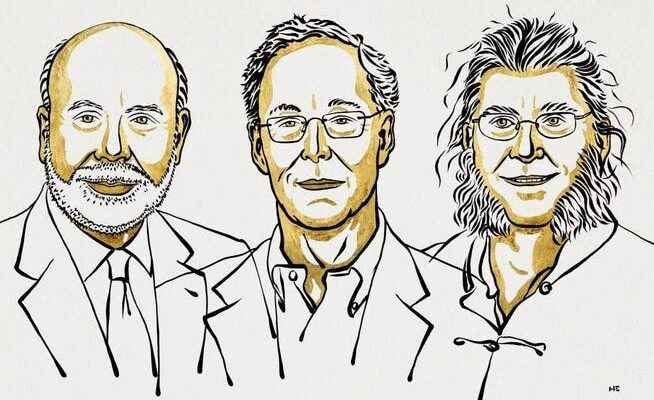Ben Bernanke, Douglas Diamond and Philip Dybvig receive the Swedish National Bank’s Business Award in memory of Alfred Nobel. Thanks to research by US economists, we better understand the role of banks.
Ben Bernanke, Douglas Diamond and Philip Dybvig receive the Nobel Prize in Economics.
The Nobel Prize in Economics goes to the USA again: As the Royal Swedish Academy of Sciences announced on Monday in Stockholm, the American researchers Ben S. Bernanke (born 1953), Douglas D. Diamond (1953) and Philip H. Dybvig (1955) with this year’s The Swedish Riksbank’s economic award in memory of Alfred Nobel honored. A good 40 years ago, they laid the foundation for modern banking theory by analyzing the role of the financial sector.
According to Tore Ellingsen, chairman of the award committee, it is thanks to the three laureates that neither the financial and debt crisis of 2008 nor the recent pandemic led to a protracted global depression. Her research has laid the foundation for financial market regulation that minimizes the risk of bank failures.
What influence do rumors have?
The theoretical work of Douglas Diamond (University of Chicago) and Philip Dybvig (Washington University in St. Louis) showed that banks are the optimal intermediaries between savers with short-term interests and investors with long-term perspectives. However, the two economists also explained why rumors can trigger a run on banks and ultimately lead to their collapse, which then plunges the entire economy into a deep crisis. With state deposit guarantees and the willingness to help ailing banks with emergency loans, the bankruptcy of financial institutions and its catastrophic consequences can be prevented.
Ben Bernanke, of the Brookings Institution in Washington, is credited for his analysis of the global depression of the 1930s. In his research published in 1983, which is based on the analysis of statistical data and historical sources, he broke with the previously widespread view that the run on the banks was a result of the economic crisis. Rather, Bernanke showed that the collapse of the financial sector in the US triggered the deep depression that spread to other countries like wildfire and from which the global economy only began to recover in the middle of the decade. Bernanke’s theoretical knowledge came in handy in 2008 and 2009 when, as head of the US Federal Reserve, he had to navigate through the financial and debt crisis.
No “real” Nobel Prize
The award, which will be presented for the 54th time, is not actually a Nobel Prize, but was launched in 1969 by the Swedish Reichsbank on the occasion of its 300th anniversary. The “Business Prize in memory of Alfred Nobel” has the same claim as the original Nobel Prizes, namely to honor research that brings the greatest possible benefit to mankind. Like the other prizewinners, this year’s laureates are invited to Stockholm on December 10th, where they will be presented with medals, diplomas and 10 million SKR. (around 880,000 Fr.) will be rewarded.
